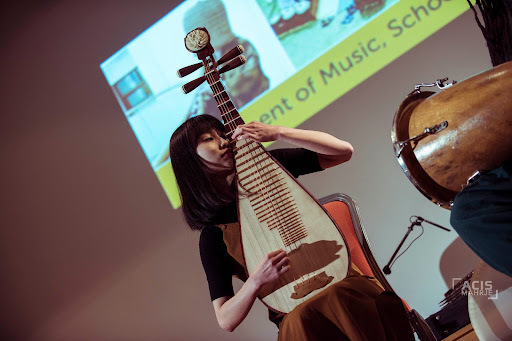By Jo-Gerard Re’Em, BMus
The SOAS Bachelor of Music (BMus) undergraduate degree is in its final months and the last two students of the BA Global Music degree graduate next year. The programmes are being discontinued and their modules swallowed up by the broader BA Creative Arts degree. This is part of a cull of non-remunerative modules and courses.
The cull is a response to SOAS’s financial problems and coincides with wider art education funding cuts from the former Conservative education secretary, Gavin Williamson. Lucy Duran, Head of Admissions for the BMus course, said that the cuts to the music department were ‘a big disappointment’ but she could see that the course had to go, given the circumstances.
SOAS’s crippling financial issues led to reduced admissions and made the continuation of the course unfeasible. It could not have come at a worse time. A global musical movement is happening on our front doorstep and who better to contribute to it than SOAS BMus music students.
The Guardian calls the movement ‘The British Jazz Explosion.’ A cadre of young British musicians have been catapulted to stardom, drawing to themselves a socially diverse following. Nubya Garcia, saxophonist, is stunning listeners with her lyrically melodic improvisation, with her music embracing her heritage from both sides of the Atlantic. She expresses her Caribbean influences through Soca, Calypso, and Reggae mixed with genres closer to home like Jungle, Garage, and Break-Beat. Although some of these genres are part of a chain of the same lineage (Jungle is the child of Hip-hop, Breakbeat, and Reggae), she skillfully blends them using her education in the Jazz tradition.
Other artists are experimenting with a mixture of British genres: Afro-Beat, South African Jazz, and other traditions. Musicians like saxophonist and clarinettist Shabaka Hutchings, guitarist Mansur Brown, and band Kokoroko, are all drawing on their heritage to construct an exciting new British musical identity. The music produced by these artists popularises a British sound that compliments British cosmopolitanism. A SOAS music student with their grounding in ethnomusicological concepts and theories would be in prime position to analyse, report on and contribute towards a movement like this.
A case in point is Tess Hirst. She is a singer, a podcaster, and a SOAS graduate. Although she studied MA Music, the same set of core skills are taught in the BMus course. She has released an album and reported on the London Jazz scene with her one-off podcast for the Peabody award-winning radio programme, podcast, and online magazine, Afropop Worldwide.
Another notable ex-SOAS music student is Poppy Ajudha. She studied music at an undergraduate level. Her smooth Soul-Jazz infusion and the undoubtably London inflections of her voice makes for an enjoyable listen. She has collaborated with the well-known artist Tom Misch. She is also politically active, saying to the Evening Standard, ‘If it challenges societal norms then I’m up for it.’ No doubt this tendency towards advocacy was nurtured at SOAS.
During my time at SOAS I have met countless interesting musicians that have changed my outlook towards what it means to be a performer. They are versed in the traditions that they grew up in and in traditions that are not widely practised in this country. This nurtures an environment of constant knowledge exchange and growth.
SOAS has been a hub for musicians that have not been educated in the classical musical tradition. Many haven’t taken A-Level music and are not acquainted with western musical concepts. In SOAS, students learn about music through a deep understanding of the cultural context and the people that play in the tradition. This is invaluable in achieving authenticity in the music industry. As a former student of the Jazz course at Trinity Laban Conservatoire of Music and Dance, the teaching style has been and continues to be refreshing. The course does not promote an elitist attitude and all are welcome to try what they want, as long as it fits into the remit of the course. I have been given the connections and resources to start up my own band, playing Afro-beat, with people who interest me, both musically and generally.
SOAS music students are involved with a number of fantastic institutions that nurture young talent. Organisations like Tomorrow’s Warriors, Grand Union Orchestra (GUO), and National Youth Jazz Orchestra (NYJO) have all educated young people in the performance, history and appreciation of music from all around the world. The SOAS music department is a vital part of this educational network which diversifies and supports important sections of the British music industry and community.
A sad loss to the field of music studies in Britain.
Despite the end of the BMus and BA Global Music undergraduate courses, the MA Music will continue. The masters course will offer musicians and others the chance to discover music in the SOAS way. Anyone studying the BA Creative Arts degree will also find a pathway in music studies as well. This said, the undergraduate music degrees have been a stepping stone for people who may not want to pursue academia past an undergraduate level but still want a career in music. The BMus and BA Global Music programmes have been a site for critical thinking where students can reflect, promote and practice global music. They will be a sad loss to the field of music studies in Britain.
Photo Credit: SOAS Facebook
